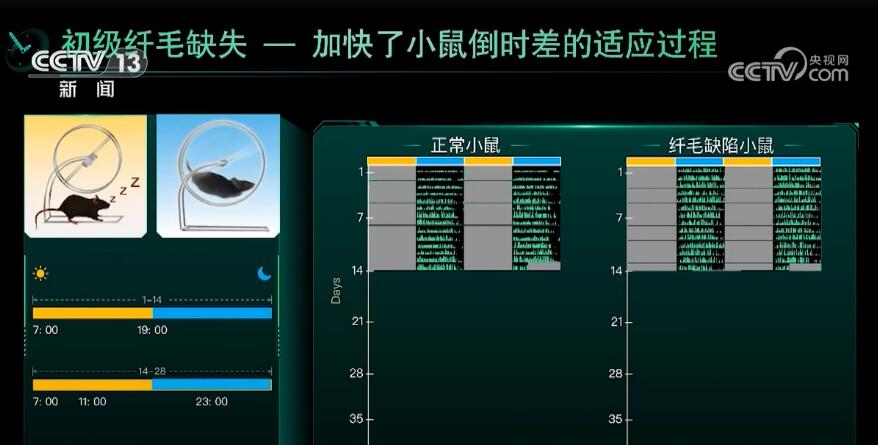Chinese scientists have made a major breakthrough in the study of biological clock.
CCTV News:Traveling across time zones, working in shifts, staying up late and working overtime, etc., often make some people suffer from the disorder of biological clock, manifested as sleep disorders and other symptoms. After years of research, the scientific research team of the Institute of Military Medicine of the Academy of Military Sciences found the root causes of such symptoms and proposed solutions. The relevant results were published in the international authoritative academic journal Science.
Reporter Zhou Su:The concept of biological clock is no stranger to everyone. We usually say that our biological clock is out of order after traveling across time zones or staying up late. This invisible "clock" is invisible and intangible. Behind me are the researchers from the Institute of Military Medicine of the Academy of Military Sciences. Through continuous exploration, they have discovered the principle that leads to the disorder of the biological clock, which is expected to find clinical drugs to regulate the biological clock and improve symptoms such as insomnia and metabolic disorder.
Circadian rhythm is a kind of rhythmic life activity law formed by organisms in order to adapt to the day-night alternation caused by the earth’s rotation. It is understood that the SCN (suprachiasmatic nucleus) region of the brain is the command center of circadian rhythm, but how it maintains the stability of the internal rhythm of the body is still unclear in previous studies. At present, no clinical drugs for rhythm regulation have been developed internationally.

Li Huiyan, a researcher at the Institute of Military Medicine, Academy of Military Sciences:We didn’t know how the biological clock was maintained and adjusted before. Only when its principle is clear, can we interfere with it and treat it symptomatically when the rhythm is disordered.
After years of painstaking research, researchers have found that the cilia of nerve cells in the brain, like an antenna, expand and contract every 24 hours, just like the hands on a clock, through which the rhythm and time difference can be adjusted.
Li Huiyan, a researcher at the Institute of Military Medicine, Academy of Military Sciences:The biological clock has always been regarded as an invisible "clock". This time, we found that the rhythmic changes of the antenna-like primary cilia protruding from the cell surface indicate that the biological clock is a tangible and visual internal clock.
In the study, researchers discovered the special phenomenon of cilia rhythm change through continuous observation of the cilia structure in SCN region of the brain, and revealed that cilia has the function of rhythm adjustment. More importantly, cilia can drive the same-frequency resonance between cells, and finally achieve the consistency of internal rhythm of the body.

Li Huiyan, a researcher at the Institute of Military Medicine, Academy of Military Sciences:We found that cilia are organelles that realize the same frequency resonance of biological clocks, and we can use this discovery to regulate biological clocks. When the rhythm is disordered, we can turn it off and reset it completely. At this time, when the outside world gives a new rhythm, the body can immediately establish a new, stable and healthy rhythm that is completely synchronized with the outside world.
Zhang Xuemin, Academician of China Academy of Sciences and Researcher of Military Medical Research Institute of Academy of Military Sciences:We found that cilia is an important organelle for regulating rhythm. Without cilia structure, neurons in SCN region of specific nuclei in the brain can not achieve co-frequency resonance, so it is difficult for the body to resist the interference of external environment on body rhythm.
Subsequently, the researchers conducted a jet lag experiment in mice, and normal mice needed 7-mdash; It takes 9 days to adapt to the new time period, while the experimental mice only need 1-mdash; 2 days to adapt to the new time period. This discovery opens up a new path for the research and development of new drugs for rhythm regulation. Today, Chinese scientists have found that the cilia of specific neurons are organelles for regulating rhythm. This original discovery was published in the international authoritative academic journal Science, which makes researchers more confident in finding drugs and solving related health problems, and provides principles for the treatment of diseases caused by rhythm disorders.
Zhang Xuemin, Academician of China Academy of Sciences and Researcher of Military Medical Research Institute of Academy of Military Sciences:Scientific research needs inspiration, passion and persistence. If we enter such a state, nothing excites us more than scientific discovery. We realize that this is an extremely important scientific discovery. Based on this original discovery, we may solve many diseases that could not be solved in the past.